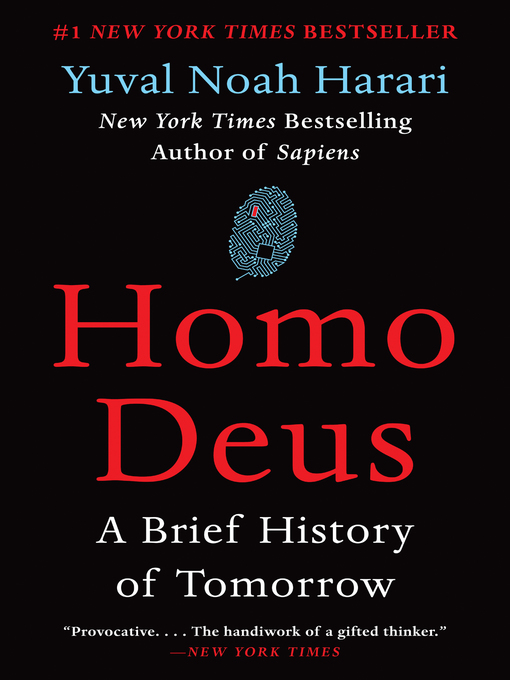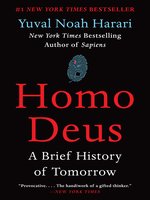-

January 9, 2017
Harari (Sapiens), professor of history at the Hebrew University of Jerusalem, provocatively explores what the future may have in store for humans in this deeply troubling book. He makes it clear that it is impossible to predict the future, so claims to be offering “possibilities rather than prophecies”—and builds a strong case for a very specific outcome. The future to which he affords the greatest probability is, in many ways, a dystopian world in which humanism has given way to “dataism”—the belief that value is measured by its contribution to information transfer—and humans play an insignificant role in world affairs or have gone extinct. The roles humans play are diminishing, Harari argues, because increasingly our creations are able to demonstrate intelligence beyond human levels and without consciousness. Whether one accepts Harari’s vision, it’s a bumpy journey to that conclusion. He rousingly defends the argument that humans have made the world safer from disease and famine—though his position that warfare has decreased remains controversial and debatable. The next steps on the road to dataism, he predicts, are through three major projects: “immortality, happiness, and divinity.” Harari paints with a very broad brush throughout, but he raises stimulating questions about both the past and the future.
-

Starred review from December 1, 2016
In an intellectually provocative follow-up to Sapiens (2015), Harari (History/Hebrew Univ. of Jerusalem) looks to the future.Throughout history, humans prayed for deliverance from famine, disease, and war with spotty success. For centuries, prophets agreed that all of the suffering was "an integral part of God's cosmic plan." Today, obesity kills more humans than starvation, old age more than disease, and suicide more than murder. Having reduced three horsemen of the apocalypse to technical problems, what will humans do next? Harari's answer: we will become gods--not perfect but like Greek or Hindu gods: immortal and possessing superpowers but with some foibles. Although an atheist, the author does not demean religion. "Up until modern times," he writes, "most cultures believed that humans play a part in some cosmic plan...devised by the omnipotent gods, or by the eternal laws of nature, and humankind could not change it. The cosmic plan gave meaning to human life, but also restricted human power." Even without this agency, this belief gave our lives meaning: disasters happened for a reason, and everything would work out for the best. Deeply satisfying, this remains a core belief of most humans, including nonchurchgoers. Since the Enlightenment, the explosion of knowledge has produced dazzling progress but limited the influence of God. Many thinkers--if not the general public--agree that there is no cosmic plan but also that humans are no longer humble victims of fate. This is humanism, which grants us immense power, the benefits of which are obvious but come at a painful price. Modern culture is the most creative in history, but, faced with "a universe devoid of meaning," it's "plagued with more existential angst than any previous culture." As in Sapiens, smoothly tackles thorny issues and leads us through "our current predicament and our possible futures." A relentlessly fascinating book that is sure to become--and deserves to be--a bestseller.
COPYRIGHT(2016) Kirkus Reviews, ALL RIGHTS RESERVED.
-

January 1, 2017
Harari (history, Hebrew Univ. of Jerusalem) recaps the cognitive, agricultural, industrial, and scientific revolutions from Sapiens, his previous best seller, to highlight a shift in the locus of divinity, from shared beliefs about nature to gods to social systems and, ultimately, to humankind itself. He posits that current efforts to cure disease, disability, and death will result in biological augmentation that creates a human species beyond Homo sapiens and that this will necessarily happen along socioeconomic lines. Humanistic systems currently holding sway, such as capitalism or socialism, will disappear if humans no longer are subject to scarcity or disease. Accepting the current idea that all change is controlled by deterministic algorithms (social, biological, or computational), Harari foresees a future of data-driven technological utilitarianism if we continue to off-load decision-making responsibility to artificial intelligence. This work is speculative, obviously, and posits that if something is technologically possible, we will try it, not that we will succeed. It leaves readers with questions about consciousness and conscience and whether unrestricted data flow will necessarily lead to wisdom. VERDICT While still appealing to those of a political, historical, or anthropological bent who enjoyed Sapiens, this title will be equally thought provoking to biologists and technological futurists. [See Prepub Alert, 8/8/16.]--Wade M. Lee, Univ. of Toledo Lib.
Copyright 2017 Library Journal, LLC Used with permission.
-

September 15, 2016
Having assessed humanity's past in the internationally best-selling Sapiens: A Brief History of Humankind, Hebrew University professor Harari looks to the future. He argues that with the age-old scourges of famine, plague, and war now under control, we're on to the next stage: Homo Deus. With a 200,000-copy first printing.
Copyright 2016 Library Journal, LLC Used with permission.
-

January 1, 2017
Humanity has never been less violent, susceptible to plague, or at risk of famine than it is right now, asserts historian Harari (Sapiens: A Brief History of Humankind, 2011). So what will Homo sapiens strive toward next? According to Harari: immortality, by way of death-conquering drugs; bliss, via biochemical manipulations engineered to induce everlasting pleasure; and divinity, which we will achieve through biotechnology enhancements and the brave new religions of Silicon Valley. He also tackles the time bomb of modern humanism, which, along with the liberal package of individualism, human rights, democracy and the free market, may be the seeds of humanity's undoing. Careful to classify his arguments as possibilities rather than prophesies, Harari's many predictions about the future of humanity toggle between solemn and starry-eyed, depending on the reader's perspective. It's sometimes hard to tell what kind of book it is, given the array of disciplines Harari covers in depth. But like humanity itself, it's an intelligent, panoramic, if sometimes messy assemblage of where we've been and what's to come. Best for readers who crave big ideas.(Reprinted with permission of Booklist, copyright 2017, American Library Association.)
-
Daniel Kahneman, author of Thinking Fast, and Slow
"Homo Deus will shock you. It will entertain you. Above all, it will make you think in ways you had not thought before." — Daniel Kahneman, author of Thinking Fast, and Slow
"Thrilling to watch such a talented author trample so freely across so many disciplines... Harari's skill lies in the way he tilts the prism in all these fields and looks at the world in different ways, providing fresh angles on what we thought we knew... scintillating." — Financial Times
"Spellbinding... This is a very intelligent book, full of sharp insights and mordant wit... It is a quirky and cool book, with a sliver of ice at its heart... It is hard to imagine anyone could read this book without getting an occasional, vertiginous thrill." — Guardian
"Harari is an intellectual magpie who has plucked theories and data from many disciplines - including philosophy, theology, computer science and biology - to produce a brilliantly original, thought-provoking and important study of where mankind is heading." — Evening Standard (London)
"I enjoyed reading about these topics not from another futurist but from a historian, contextualizing our current ways of thinking amid humanity's long march–especially...with Harari's ability to capsulize big ideas memorably and mingle them with a light, dry humor...Harari offers not just history lessons but a meta-history lesson." — Washington Post
"What elevates Harari above many chroniclers of our age is his exceptional clarity and focus." — London Sunday Times
"A remarkable book, full of insights and thoughtful reinterpretations of what we thought we knew about ourselves and our history." — The Guardian
"Provocative...the handiwork of a gifted thinker." — Jennifer Senior, New York Times
"[A] great book...not only alters the way you see the world after you've read it, it also casts the past in a different light. In Homo Deus, Yuval Noah Harari shows us where mankind is headed in an absolutely clear-sighted & accessible manner." — Mail on Sunday
"Like all great epics, Sapiens demanded a sequel. Homo Deus, in which that likely apocalyptic future is imagined in spooling detail, is that book. It is a highly seductive scenario planner for the numerous ways in which we might overreach ourselves." — The Observer (London)
"Thank God someone finally wrote [this] exact book." — Sebastian Junger, New York Times Book Review
"Harari is an exceptional writer, who seems to have been specially chosen by the muses as a conduit for the zeitgeist... Fascinating reading." — Times Literary Supplement (London)
"Sapiens takes readers on a sweeping tour of the history of our species.... Harari's formidable intellect sheds light on the biggest breakthroughs in the human story...important reading for serious-minded, self-reflective sapiens." — Washington Post
"Sapiens tackles the biggest questions of history and of the modern world, and it is written in unforgettably vivid language." — Jared Diamond, Pulitzer Prize-winning author of Guns, Germs, and Steel, Collapse, and The World until Yesterday
"In Sapiens, Harari delves deep into our history as a species to help us understand who we are and what made us this way. An engrossing read." — Dan Ariely, New York Times Bestselling author of Predictably Irrational, The Upside of...








